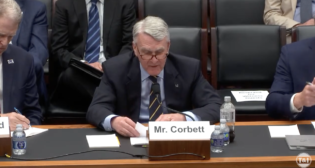
MTA, TWU Local 100 Reach Tentative Agreement
Written by Andrew CorselliMetropolitan Transportation Authority (MTA) Chairman and CEO Patrick J. Foye and Transport Workers Union (TWU) Local 100 President Tony Utano announced a tentative agreement between the two parties for a new contract.
The agreement, which is subject to ratification by the union’s members and approval by the MTA Board, provides a four-year contract for more than 37,000 transit workers. The parties also agree to create the first-ever tri-party committee with MTA, TWU and accessibility advocates, to “ensure close collaboration and continued focus on delivering these projects quickly and efficiently.”
The deal advances the MTA’s investment in making 70 stations accessible in the proposed 2020-2024 Capital Plan by accelerating the delivery of these projects.
The agreement also includes:
- Changes to modernize the health plan, which will deliver $27 million in savings through a series of changes, including increases to emergency room co-pays to encourage greater use of primary and urgent care providers; instituting nationwide in-network coverage, increasing flexibility and choice for employees among providers; and adjusting prescription drug co-pays to encourage use of generic options, among others.
- “A suite of provisions that, combined and enacted in partnership with the TWU, will ensure the MTA continues to deliver on improvements in operations while realizing savings for the financial plan. This includes a commitment to a one-and-a-half day improvement in employee availability—the number of days an employee is available and reporting to work—which will deliver an estimated $17 million in annual savings to the MTA. Availability has steadily decreased since 2000. After an improvement of one day in employee availability is achieved, any additional savings will be jointly shared between the TWU and MTA.”
- A recognition of overtime equalization as an important priority for both the MTA and TWU, to ensure that opportunities for overtime are equally available to eligible employees and that overtime is efficiently allocated. The MTA will also enforce existing contractual agreements in order to achieve this priority. The agreement also includes provisions to further modernize the agency’s approach to discipline, to ensure policies are more progressive and fair to employees—significantly advancing a key goal in Fast Forward.
- A provision to allow third-party contractors to provide a one-time deep cleaning of up to 180 subway stations.
Under the terms of the agreement, NYCT will pay an average net wage increase of 2.3% each year through May 2023. Before giving effect to health savings and increases in availability, a 1% increase in wages is approximately equal to $36 million, offset by $44 million in savings in the health plan and availability. Once the contract is ratified, workers would receive a 2% increase for 2019, a 2.25% increase in 2020, a 2.5% increase in 2021 and a 2.75% increase in 2022.
In addition, the TWU and MTA will jointly work to identify goals and align interests to increase productivity, and a clear path to achieving these improvements, with any achieved savings shared equally. The agreement allows for mutual swaps of shifts between employees in similar job classes across all TWU members for the first time, giving employees increased flexibility in scheduling while ensuring sufficient coverage for critical operational roles and minimizing overtime.
Both organizations recognize worker safety as a priority issue, and will work together to increase public awareness of assaults on transit workers, advocate for increased usage of existing provisions in State law that classify worker assaults as a felony, and create a Task Force that includes partners in law enforcement to ensure these issues receive necessary attention.
“This contract reflects the hard work of thousands of Transit employees who have helped us reach the highest on-time subway performance in more than half a decade, while providing a fair deal for taxpayers and our more than 8 million daily customers,” said Foye. “The tentative agreement is responsive to the financial challenges we face and addresses important issues such as accessibility, overtime and healthcare costs.”



